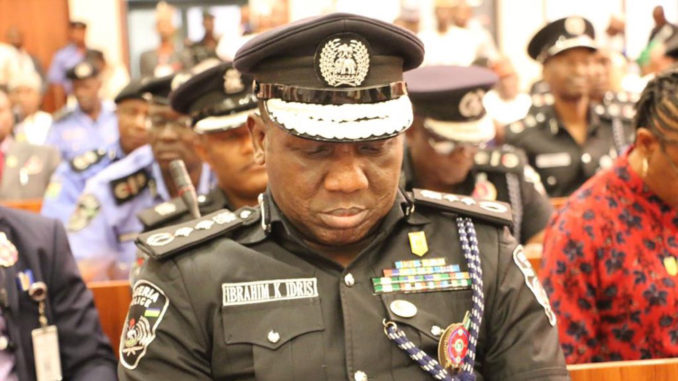
The public furore being raised against an alleged plan by President Muhammadu Buhari to extend the tenure of the Inspector General of Police (IGP), Ibrahim Idris, is not unduly misplaced having regard to the matter being of public interest in a democracy. But it could have been avoided if the presidency imbibes the habit of keeping strictly to the rule of law and due process.
That will mean in particularly that government displays sensitivity to public yearning, and avoid giving impression either that it has ulterior assignment for the officer in issue; or that there are no other competent hands in the service to carry on with the duties of the service chief. Such impressions do not augur well for the polity in a country endowed with huge population and talents in all spheres.
Some members of the public are crying foul over the presidency’s retention of the current IGP, Ibrahim Idris, beyond the January 3, 2019 date when he was expected to have retired, having completed 35 years in service. The rule of his retirement is that he leaves office after 35 years of service, or at the attainment of 60 years of age, whichever is earlier.
So far, Idris has remained in service, fuelling speculation that President Buhari wants to retain him. The speculation has been boosted by the fact that the president had extended twice, the tenures of General Abayomi Gabriel Olonisakin as Chief of Defence Staff; Vice Admiral Ibok-Ete Ekwe Ibas as Chief of Naval Staff; and Air Marshal Sadique Baba Abubakar as Chief of Air Staff. Similarly, President Buhari had extended the tenure of Lt-Gen Tukur Yusuf Buratai as Chief of Army Staff.
Already, the Coalition of United Political Parties (CUPP) has vowed to embark on a nation-wide protest if Idris does not leave office on January 15 when he clocks the mandatory retirement age. The coalition’s plan has been dismissed by the Minister of Information and Culture, Alhaji Lai Mohammed who insisted that the decision whether or not to retain the IGP is the prerogative of the president.
According to the minister, “that prerogative cannot be taken from the president on the altar of paranoia by some people.” He buttressed his position with the fact that former President Olusegun Obasanjo, in his time, extended the tenure of Mr. Sunday Ehindero as IGP; and that the late President Umaru Yar’Adua similarly extended the tenure of Mr. Mike Okiro as IGP, and “heavens didn’t fall.”
Responding to a question on his plans for the IGP, President Buhari told interviewers at Arise TV that he would soon take action. He admitted that the performance of the service chiefs “might be disappointing” but that he took responsibility for not changing them. However, the president has not addressed the major concern of opposition political parties and other stakeholders that the retention of the IGP may not guarantee free and fair elections next month.
Besides the need for the president to be sensitive to the concern of opposition, he should be mindful of section 215(1) of the 1999 Constitution, which empowers him to appoint the IGP, on the advice of the Nigeria Police Council “from among serving members of the Nigeria Police Force.” By that provision alone, the president should not allow any special or preferential treatment of the IGP outside the performance of his duty.
If the president allows an elongation of his tenure beyond the time statutorily allowed for retirement, it would amount to conferring special status on the IGP over and above his policemen colleagues. That will be improper, and capable also of intensifying lobbying and a needless stiff competition for the position. It is not good enough for the presidency to rely simply on the examples of Presidents Obasanjo and Yar’Adua to justify its own situation, particularly in the absence of a compelling reason for the retention. If the former presidents erred in their decision, President Buhari has no need to adopt the error.
The police has thousands of highly trained and experienced personnel who can perform the IGP’s duty, perhaps even better than Idris. To ignore those personnel is to frustrate their spirit of healthy ambition to, other things being equal, aspire to the epitome of their police career, which in this case, is the position of IGP.
If anything, the president ought to use the present opportunity of the statutory retirement of Idris to correct some of the bad signals being sounded by the public and come clean of the various controversies that have surrounded Mr. Idris, ranging from his confrontation with the Senate, to his refusal to honour the president’s order that he relocated to Benue State to effectively address the menace of herdsmen against the local populace.
The case of military service chiefs whose tenure were extended appears to be different from that of the IGP, in that the Armed Forces Terms and Conditions of Service stipulate a two-year tenure which could, at the pleasure of the president, be extended in so far as they have not reached their retirement age and/or attained the maximum length of service.
The presidency should be bold, follow the rules and allow the exit of officers who have served their normal term. Elongating their tenure should be an exception to be adopted only in the face of clear exigency or special attenuating circumstances.
END

Be the first to comment